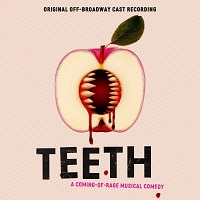 Original Off-Broadway Cast, 2024 (Yellow Sound Label)
Original Off-Broadway Cast, 2024 (Yellow Sound Label)  (4.5 / 5) Michael R. Jackson has quickly become the prince of telling unlikely stories on stage, so it shouldn’t be a surprise that his unlikeliest project yet is highly successful. Teeth, based on the cult classic film of the same title, is all about Dawn O’Keefe, stepdaughter of an ultra-religious pastor and leader of the virginal “Promise Keeper Girls.” Only her geeky stepbrother, Brad, knows her secret: Dawn has a set of teeth inside her vagina that will bite off the extremities of men who violate her. Brad found this out when he put his finger in as a child, but soon, Dawn’s boyfriend and an evil gynecologist discover her power the hard way — no pun intended. After those two involuntary attacks, Dawn learns that she has a condition known as “vagina dentata.” She also learns to use her power against her friend Ryan, who non-consensually tapes their sexual encounter; against her pastor stepfather; and finally, in a Little Shop-esque finale, against all evil men in the world. That the plot is so unusual makes it all the more impressive how smoothly and intelligently Jackson’s lyrics tell the tale. Some of his turns of phrase are extremely clever: “To keep from getting routine and banal with girls like you / I just go spelunking in the birth canal with girls like you” is a particular gem. Anna K. Jacobs’ music is expressive and appropriately lurid, even if the orchestrations here are overblown. At the center of the show, Alyse Alan Louis as Dawn is that rare phenomenon, a supernova talent with a truly unique vocal quality and presence. If there’s a more achingly real expression of desire than her performance of “Shame in My Body,” this reviewer has yet to hear it. Steven Pasquale, in the dual role of the pastor and the gynecologist, has a field day with the delightfully vulgar pastiche “Girls Like You,” and Jason Gotay as Tobey runs the gamut from nicely restrained in “Modest is Hottest” to downright threatening in “When She Gave Birth” (a musical highlight). If Teeth is a difficult show to pitch in an elevator, it’s a remarkably easy one to be amused, thrilled, and challenged by. — Charles Kirsch
(4.5 / 5) Michael R. Jackson has quickly become the prince of telling unlikely stories on stage, so it shouldn’t be a surprise that his unlikeliest project yet is highly successful. Teeth, based on the cult classic film of the same title, is all about Dawn O’Keefe, stepdaughter of an ultra-religious pastor and leader of the virginal “Promise Keeper Girls.” Only her geeky stepbrother, Brad, knows her secret: Dawn has a set of teeth inside her vagina that will bite off the extremities of men who violate her. Brad found this out when he put his finger in as a child, but soon, Dawn’s boyfriend and an evil gynecologist discover her power the hard way — no pun intended. After those two involuntary attacks, Dawn learns that she has a condition known as “vagina dentata.” She also learns to use her power against her friend Ryan, who non-consensually tapes their sexual encounter; against her pastor stepfather; and finally, in a Little Shop-esque finale, against all evil men in the world. That the plot is so unusual makes it all the more impressive how smoothly and intelligently Jackson’s lyrics tell the tale. Some of his turns of phrase are extremely clever: “To keep from getting routine and banal with girls like you / I just go spelunking in the birth canal with girls like you” is a particular gem. Anna K. Jacobs’ music is expressive and appropriately lurid, even if the orchestrations here are overblown. At the center of the show, Alyse Alan Louis as Dawn is that rare phenomenon, a supernova talent with a truly unique vocal quality and presence. If there’s a more achingly real expression of desire than her performance of “Shame in My Body,” this reviewer has yet to hear it. Steven Pasquale, in the dual role of the pastor and the gynecologist, has a field day with the delightfully vulgar pastiche “Girls Like You,” and Jason Gotay as Tobey runs the gamut from nicely restrained in “Modest is Hottest” to downright threatening in “When She Gave Birth” (a musical highlight). If Teeth is a difficult show to pitch in an elevator, it’s a remarkably easy one to be amused, thrilled, and challenged by. — Charles Kirsch
Category Archives: T-V
Tuck Everlasting
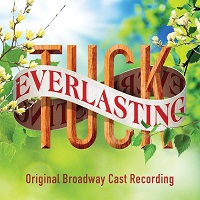 Broadway Cast, 2016 (DMI Soundtracks)
Broadway Cast, 2016 (DMI Soundtracks)  (2 / 5) Not much seems worth immortalizing when it comes to the Broadway adaptation of Natalie Babbitt’s beloved 1975 children’s novel Tuck Everlasting, in which eleven-year-old Winnie meets a family blessed (or is it cursed?) with eternal life. What the cast album does partly capture for prosperity is the creative team’s misguided attempt to stretch Babbitt’s compact storytelling into a two-act musical. The score sags especially in the elongated reveries of Mae Tuck (Carolee Carmello), remembering how her husband loved her back in their double-digit days; the scheming vaudeville turns of the evil Man in the Yellow Suit (a much-put-upon Terrence Man), who has come to steal the immortalizing spring water; and the comic detective numbers for Michael Wartella and Fred Applegate. John Clancy’s folk-doused orchestrations do most of the heavy lifting here, with lots of pizzicato plucks and pan-flute toots doing their best to distract from Chris Miller’s often underdeveloped melodies. Nathan Tysen’s lyrics are marred by a forced series of rhymes such as “handbook” / “exactly as planned, look” / “cranny and nook.” Miller and Tysen do succeed dramatically in “The Story of the Tucks,” in which the family members talk over each other trying to tell Winnie their big secret. Although Sarah Charles Lewis as Winnie sounds older than her pre-teen years, and Andrew Keenan-Bolger sings with a boyish charm, the show never resolves the squeamish courtship between a 104-year-old man in a 17-year-old’s body and an 11-year-old girl (“I’ll wait for you / ’Till you turn seventeen,” he sings in the discomfiting act one finale). Also, the Broadway production’s most-praised sequence, “The Story of Winnie Foster” — a ballet in which Winnie lives a full life and then arrives at a peaceful death in old age — has hardly the same impact without the emotional narrative in the staging. — Dan Rubins
(2 / 5) Not much seems worth immortalizing when it comes to the Broadway adaptation of Natalie Babbitt’s beloved 1975 children’s novel Tuck Everlasting, in which eleven-year-old Winnie meets a family blessed (or is it cursed?) with eternal life. What the cast album does partly capture for prosperity is the creative team’s misguided attempt to stretch Babbitt’s compact storytelling into a two-act musical. The score sags especially in the elongated reveries of Mae Tuck (Carolee Carmello), remembering how her husband loved her back in their double-digit days; the scheming vaudeville turns of the evil Man in the Yellow Suit (a much-put-upon Terrence Man), who has come to steal the immortalizing spring water; and the comic detective numbers for Michael Wartella and Fred Applegate. John Clancy’s folk-doused orchestrations do most of the heavy lifting here, with lots of pizzicato plucks and pan-flute toots doing their best to distract from Chris Miller’s often underdeveloped melodies. Nathan Tysen’s lyrics are marred by a forced series of rhymes such as “handbook” / “exactly as planned, look” / “cranny and nook.” Miller and Tysen do succeed dramatically in “The Story of the Tucks,” in which the family members talk over each other trying to tell Winnie their big secret. Although Sarah Charles Lewis as Winnie sounds older than her pre-teen years, and Andrew Keenan-Bolger sings with a boyish charm, the show never resolves the squeamish courtship between a 104-year-old man in a 17-year-old’s body and an 11-year-old girl (“I’ll wait for you / ’Till you turn seventeen,” he sings in the discomfiting act one finale). Also, the Broadway production’s most-praised sequence, “The Story of Winnie Foster” — a ballet in which Winnie lives a full life and then arrives at a peaceful death in old age — has hardly the same impact without the emotional narrative in the staging. — Dan Rubins
13
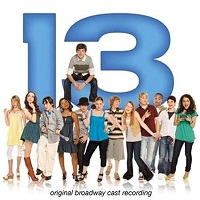 Original Broadway Cast, 2008 (Ghostlight)
Original Broadway Cast, 2008 (Ghostlight)  (2 / 5) Musical theater writers from Strouse and Adams to Pasek and Paul have tried to write musicals capturing the spirit of what it means to be a teenager. As a teen myself (at this writing), I have to report that Jason Robert Brown’s 13 is pretty far off the target. Brown, who has written brilliant and complex musicals about adults, did not apply the layers to these young characters that they deserve, instead choosing to employ stereotypes and a paper-thin plotline that does not merit such a lengthy score. The show tells the story of about-to-be Bar Mitzvah boy Evan (portrayed admirably by Graham Phillips), who finds his life uprooted after his parents get divorced and he is forced to move from New York City to a town in Indiana, referred to by the show’s best known song as “The Lamest Place in the World.” The opening number/title song is quite catchy and fun, but the score goes downhill from there. One of the oddest touches is “Terminal Illness,” a comedic song that Evan sings to his friend Archie (Aaron Simon Gross), who has been diagnosed with muscular dystrophy, as a way of convincing him to use his disease for emotional manipulation of others. The song comes across as not only tone-deaf, but so upsetting in reference to a 13-year-old boy that its place at the beginning of the album lost this listener. The more fun moments in 13 are conveyed in admittedly simple music and lyrics, such as the cheerleading blast “Opportunity” (cut from the stage show but included on the recording) and the doo-wop-inspired “Bad, Bad News.” This show deserves credit for casting actors whose ages were close to those of their characters, but that’s not entirely an upside, as the voices of the pubescent actors sometimes sound pretty rough and untrained. That said, 13 served as a very early credit for future superstars Elizabeth Gillies and Ariana Grande. Both of them give charming performances, but in the end, none of the earnest cast members can salvage the material, especially the show’s almost laughably predictable conclusion: “A Little More Homework.” Nor are they helped by the fact that every song is about twice as long as it needs to be. Puberty is unquestionably difficult to get through, but did a musical about it need to give us the same feeling? — Charles Kirsch
(2 / 5) Musical theater writers from Strouse and Adams to Pasek and Paul have tried to write musicals capturing the spirit of what it means to be a teenager. As a teen myself (at this writing), I have to report that Jason Robert Brown’s 13 is pretty far off the target. Brown, who has written brilliant and complex musicals about adults, did not apply the layers to these young characters that they deserve, instead choosing to employ stereotypes and a paper-thin plotline that does not merit such a lengthy score. The show tells the story of about-to-be Bar Mitzvah boy Evan (portrayed admirably by Graham Phillips), who finds his life uprooted after his parents get divorced and he is forced to move from New York City to a town in Indiana, referred to by the show’s best known song as “The Lamest Place in the World.” The opening number/title song is quite catchy and fun, but the score goes downhill from there. One of the oddest touches is “Terminal Illness,” a comedic song that Evan sings to his friend Archie (Aaron Simon Gross), who has been diagnosed with muscular dystrophy, as a way of convincing him to use his disease for emotional manipulation of others. The song comes across as not only tone-deaf, but so upsetting in reference to a 13-year-old boy that its place at the beginning of the album lost this listener. The more fun moments in 13 are conveyed in admittedly simple music and lyrics, such as the cheerleading blast “Opportunity” (cut from the stage show but included on the recording) and the doo-wop-inspired “Bad, Bad News.” This show deserves credit for casting actors whose ages were close to those of their characters, but that’s not entirely an upside, as the voices of the pubescent actors sometimes sound pretty rough and untrained. That said, 13 served as a very early credit for future superstars Elizabeth Gillies and Ariana Grande. Both of them give charming performances, but in the end, none of the earnest cast members can salvage the material, especially the show’s almost laughably predictable conclusion: “A Little More Homework.” Nor are they helped by the fact that every song is about twice as long as it needs to be. Puberty is unquestionably difficult to get through, but did a musical about it need to give us the same feeling? — Charles Kirsch
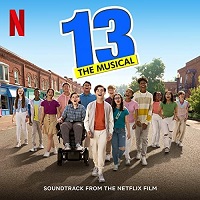 Film Soundtrack, 2022 (Netflix Music)
Film Soundtrack, 2022 (Netflix Music)  (4 / 5) Right from the start of this recording, it’s easy to tell that the score of 13 has been completely redone for the Netflix film version — but that’s not a bad thing. Vocals are provided by child actors including the charming Eli Golden as Evan and Gabriella Uhl, who is talented beyond her years, as his neighbor Patrice. These performances combined with new, pop orchestrations make 13 what it always should’ve been: a high-octane, if slightly generic, romp. In this form, with 30 minutes of musical filler taken out and three new songs added, the score is far better suited to the thin story and manages to make more of an impact by trying to do less. Brown’s new compositions are noteworthy, especially “It Would Be Funny,” a heartfelt and catchy duet for Evan and the added character of his mother (played nicely by Debra Messing). “The Bloodmaster” is an excellent song for a moment that always should have been musicalized. “I’ve Been Waiting” uses the lead vocals of Lindsey Blackwell to bring a more up-to-date musical style to the score. Bonus tracks include an admirable rendition of “What It Means to Be a Friend,” sadly cut from the final product, and an auto-tuned cover of “Tell Her” by Alec Benjamin that effectively hides the song’s sappy lyrics. While purists will prefer a fuller version of the score, those seeking a shorter and sweeter listening experience should choose the Netflix album. — C.K.
(4 / 5) Right from the start of this recording, it’s easy to tell that the score of 13 has been completely redone for the Netflix film version — but that’s not a bad thing. Vocals are provided by child actors including the charming Eli Golden as Evan and Gabriella Uhl, who is talented beyond her years, as his neighbor Patrice. These performances combined with new, pop orchestrations make 13 what it always should’ve been: a high-octane, if slightly generic, romp. In this form, with 30 minutes of musical filler taken out and three new songs added, the score is far better suited to the thin story and manages to make more of an impact by trying to do less. Brown’s new compositions are noteworthy, especially “It Would Be Funny,” a heartfelt and catchy duet for Evan and the added character of his mother (played nicely by Debra Messing). “The Bloodmaster” is an excellent song for a moment that always should have been musicalized. “I’ve Been Waiting” uses the lead vocals of Lindsey Blackwell to bring a more up-to-date musical style to the score. Bonus tracks include an admirable rendition of “What It Means to Be a Friend,” sadly cut from the final product, and an auto-tuned cover of “Tell Her” by Alec Benjamin that effectively hides the song’s sappy lyrics. While purists will prefer a fuller version of the score, those seeking a shorter and sweeter listening experience should choose the Netflix album. — C.K.
Twelfth Night
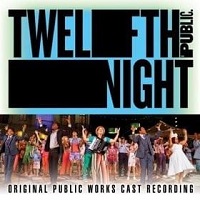 Original Public Works Cast, 2018 (Craft Recordings)
Original Public Works Cast, 2018 (Craft Recordings)  (4 / 5) The first (and better) of Shaina Taub’s pair of Shakespeare-inspired scores for the Public Theater’s Public Works program, Twelfth Night marvelously marries Taub’s distinctive blues-inflected funk pop vocabulary with Mike Brun’s New Orleans brass arrangements. Taub turns Shakespeare into an ideal collaborator; spoken excerpts of the play’s text weave seamlessly in and out of the songs, and Taub finds the germ of each song in Shakespeare’s language. A well-constructed opening number, “Play On,” musically stresses the story’s love triangle. Nikki M. James (Viola), Nanya-Akuki Goodrich (Olivia), and Ato Blankson-Wood (Orsino) all sing terrifically, and Taub frequently throws her characters into sinewy, climactic counterpoints that capture the play’s tangled romantic webs. The comic material for Sir Toby Belch (Shuler Hensley) and Malvolio (Andrew Kober) is slighter stuff, but Taub adds in a few fun ensemble numbers (example: “Word on the Street”) for Illyria’s gossipy citizenry. Best of all is “Is This Not Love,” a ballad sung yearningly first by Taub herself as the clown, Feste, and then reprised powerfully by ensemble member Vivian Jett. — Dan Rubins
(4 / 5) The first (and better) of Shaina Taub’s pair of Shakespeare-inspired scores for the Public Theater’s Public Works program, Twelfth Night marvelously marries Taub’s distinctive blues-inflected funk pop vocabulary with Mike Brun’s New Orleans brass arrangements. Taub turns Shakespeare into an ideal collaborator; spoken excerpts of the play’s text weave seamlessly in and out of the songs, and Taub finds the germ of each song in Shakespeare’s language. A well-constructed opening number, “Play On,” musically stresses the story’s love triangle. Nikki M. James (Viola), Nanya-Akuki Goodrich (Olivia), and Ato Blankson-Wood (Orsino) all sing terrifically, and Taub frequently throws her characters into sinewy, climactic counterpoints that capture the play’s tangled romantic webs. The comic material for Sir Toby Belch (Shuler Hensley) and Malvolio (Andrew Kober) is slighter stuff, but Taub adds in a few fun ensemble numbers (example: “Word on the Street”) for Illyria’s gossipy citizenry. Best of all is “Is This Not Love,” a ballad sung yearningly first by Taub herself as the clown, Feste, and then reprised powerfully by ensemble member Vivian Jett. — Dan Rubins
The Visitor
 Original Off-Broadway Cast, 2022 (Craft Recordings)
Original Off-Broadway Cast, 2022 (Craft Recordings)  (2 / 5) “A few djembe lessons and like that I am enlightened,” sings Walter (David Hyde Pierce), a grumpy economics professor who learns to play percussion — and finds out all about America’s cruel immigration policies — from an undocumented Syrian immigrant named Tarek (Ahmad Maksoud), who has been squatting with his girlfriend, Zainab (Alysha Deslorieux), in Walter’s vacant apartment. The cast album of The Visitor, in the absence of Kwame Kwei-Armah and Brian Yorkey’s squirmy book, does a better job than the show did onstage of distracting from the story’s troubling focus on how the suffering of a family in the clutches of the immigration system reanimates a middle-aged white guy, but there’s still that uncomfortable undercurrent. This is a Tom Kitt score, so the vocal arrangements are reliably superb, and Kitt creates some riveting grooves, enhanced by the orchestrations of Jamshied Sharifi (The Band’s Visit). The score cleverly suggests the way that music is all around us — hear, for example, the rhythmic shushing and rustling of papers in the song “In The Middle of The Middle Row” — all of which works effectively on the recording. But there’s little subtlety or sensitivity in Yorkey’s lyrics, as when Zainab describes her harrowing journey to the U.S., in ungraceful phrases such as: “But the price of the voyage was steep/They would touch me when I was asleep.” Thankfully, though, Deslorieux is marvelous. Her impassioned “Zainab’s Apology” and an undulating duet for Zainab and Tarek, “My Love Is Free,” merit multiple listens. Hyde Pierce also gives a moving, committed performance, even if his songs become progressively worse as Walter sheds his misanthropy. (“Better Angels” is a particularly cringe-inducing anthem bellowed at uncaring ICE agents.) He does his loveliest work, alongside Jacqueline Antamarian as Tarek’s fraught mother, in the unassuming “What Little I Can Do.” This album can’t redeem a deeply flawed musical, but the strong singing and engaging arrangements make this a score worth a listen. — Dan Rubins
(2 / 5) “A few djembe lessons and like that I am enlightened,” sings Walter (David Hyde Pierce), a grumpy economics professor who learns to play percussion — and finds out all about America’s cruel immigration policies — from an undocumented Syrian immigrant named Tarek (Ahmad Maksoud), who has been squatting with his girlfriend, Zainab (Alysha Deslorieux), in Walter’s vacant apartment. The cast album of The Visitor, in the absence of Kwame Kwei-Armah and Brian Yorkey’s squirmy book, does a better job than the show did onstage of distracting from the story’s troubling focus on how the suffering of a family in the clutches of the immigration system reanimates a middle-aged white guy, but there’s still that uncomfortable undercurrent. This is a Tom Kitt score, so the vocal arrangements are reliably superb, and Kitt creates some riveting grooves, enhanced by the orchestrations of Jamshied Sharifi (The Band’s Visit). The score cleverly suggests the way that music is all around us — hear, for example, the rhythmic shushing and rustling of papers in the song “In The Middle of The Middle Row” — all of which works effectively on the recording. But there’s little subtlety or sensitivity in Yorkey’s lyrics, as when Zainab describes her harrowing journey to the U.S., in ungraceful phrases such as: “But the price of the voyage was steep/They would touch me when I was asleep.” Thankfully, though, Deslorieux is marvelous. Her impassioned “Zainab’s Apology” and an undulating duet for Zainab and Tarek, “My Love Is Free,” merit multiple listens. Hyde Pierce also gives a moving, committed performance, even if his songs become progressively worse as Walter sheds his misanthropy. (“Better Angels” is a particularly cringe-inducing anthem bellowed at uncaring ICE agents.) He does his loveliest work, alongside Jacqueline Antamarian as Tarek’s fraught mother, in the unassuming “What Little I Can Do.” This album can’t redeem a deeply flawed musical, but the strong singing and engaging arrangements make this a score worth a listen. — Dan Rubins
The Visit
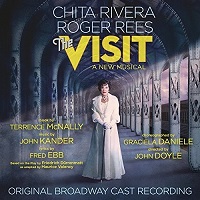 Original Broadway Cast, 2015 (Broadway Records)
Original Broadway Cast, 2015 (Broadway Records)  (4 / 5) The Visit is an extraordinary late-career work by composer John Kander and lyricist Fred Ebb, who enriched the American musical theater with multiple scores of excellent quality over a 40-year period. In partnership with book writer Terrence McNally, their previous collaborator for The Rink and Kiss of the Spider Woman, Kander & Ebb crafted a flawed but compelling adaptation of Friedrich Dürrenmatt’s play about Claire Zachanassian, a fabulously wealthy old woman who returns to the town where she grew up and offers to save it from financial ruin if the citizens will be the agents of her ultimate revenge against Anton Schill, her former lover, who wronged her terribly when they were both in their youth. Shocking, moving, and bitterly funny by turns, this story has been musicalized skillfully, for the most part, in songs that run the gamut from the darkly comic “I Walk Away” to the gorgeous love ballad “You, You, You” to the creepy “I Will Never Leave You” to the hauntingly wistful “Love and Love Alone.” One of the most astonishing facets of the show is the production number “Yellow Shoes,” in which the townspeople rejoice over material goods purchased with credit they have been granted in anticipation of the windfall they expect in return for murdering Schill. Following runs in Chicago and at the Signature Theatre in the Washington, D.C. metro area, a shortened version of The Visit was presented as part of the Williamstown Theater Festival in 2014 and then came to New York the following year in a production poorly directed by John Doyle. The Broadway run amounted to only 61 performances, but that tally should not dissuade one from experiencing the cast album, which showcases the stellar performance of beloved Broadway veteran Chita Rivera as Claire. Captivating as always, Rivera is partnered by the Anton of Roger Rees, who recorded this album while suffering from the brain cancer that forced him to bow out of The Visit during its short Broadway run. (In retrospect, his passing in July 2015, as well as the deaths of Fred Ebb in 2004 and Terrence McNally in 2020, amplify and deepen the elegiac feel of the recording.) Among the other standouts in the cast are Jason Danieley as the schoolmaster who represents the conscience of the town in “The Only One”; Tom Nelis, Matthew Deming, and Chris Newcomer as Claire’s “entourage,” two of them eunuchs who sing in falsetto; and, in the role of Young Anton, John Riddle, whose beautiful tenor is a pleasure to hear in “You, You, You.” With a score that also contains a few songs less effective than those mentioned above, The Visit is not so finely honed a musical as the very best of the best, such as Kander & Ebb’s Cabaret and Chicago, but it’s a worthy addition to the canon. — Michael Portantiere
(4 / 5) The Visit is an extraordinary late-career work by composer John Kander and lyricist Fred Ebb, who enriched the American musical theater with multiple scores of excellent quality over a 40-year period. In partnership with book writer Terrence McNally, their previous collaborator for The Rink and Kiss of the Spider Woman, Kander & Ebb crafted a flawed but compelling adaptation of Friedrich Dürrenmatt’s play about Claire Zachanassian, a fabulously wealthy old woman who returns to the town where she grew up and offers to save it from financial ruin if the citizens will be the agents of her ultimate revenge against Anton Schill, her former lover, who wronged her terribly when they were both in their youth. Shocking, moving, and bitterly funny by turns, this story has been musicalized skillfully, for the most part, in songs that run the gamut from the darkly comic “I Walk Away” to the gorgeous love ballad “You, You, You” to the creepy “I Will Never Leave You” to the hauntingly wistful “Love and Love Alone.” One of the most astonishing facets of the show is the production number “Yellow Shoes,” in which the townspeople rejoice over material goods purchased with credit they have been granted in anticipation of the windfall they expect in return for murdering Schill. Following runs in Chicago and at the Signature Theatre in the Washington, D.C. metro area, a shortened version of The Visit was presented as part of the Williamstown Theater Festival in 2014 and then came to New York the following year in a production poorly directed by John Doyle. The Broadway run amounted to only 61 performances, but that tally should not dissuade one from experiencing the cast album, which showcases the stellar performance of beloved Broadway veteran Chita Rivera as Claire. Captivating as always, Rivera is partnered by the Anton of Roger Rees, who recorded this album while suffering from the brain cancer that forced him to bow out of The Visit during its short Broadway run. (In retrospect, his passing in July 2015, as well as the deaths of Fred Ebb in 2004 and Terrence McNally in 2020, amplify and deepen the elegiac feel of the recording.) Among the other standouts in the cast are Jason Danieley as the schoolmaster who represents the conscience of the town in “The Only One”; Tom Nelis, Matthew Deming, and Chris Newcomer as Claire’s “entourage,” two of them eunuchs who sing in falsetto; and, in the role of Young Anton, John Riddle, whose beautiful tenor is a pleasure to hear in “You, You, You.” With a score that also contains a few songs less effective than those mentioned above, The Visit is not so finely honed a musical as the very best of the best, such as Kander & Ebb’s Cabaret and Chicago, but it’s a worthy addition to the canon. — Michael Portantiere
Tina: The Tina Turner Musical
 Original London Cast, 2019 (Ghostlight)
Original London Cast, 2019 (Ghostlight)  (3 / 5) When experienced live in the theater, a “bio-musical” — like any other show — may be judged on several levels, including the production values and the quality of the storytelling, over and above the performances. But a cast album is all about the music. In that regard, this recording of Tina: The Tina Turner Musical, shorn of the show’s execrable book and direction, succeeds thanks to the searing, passionate singing of Adrienne Warren in the title role. Also a pleasure to hear are the arrangements (by Nicholas Skilbeck) and orchestrations (by Ethan Popp), which deftly approximate the original charts of the songs that brought Turner worldwide fame during her decades-long career as a rock music goddess. Warren was an Olivier Award nominee for this role on the London stage, and her portrayal was considered so vital to the show’s success that she was signed to repeat it on Broadway. Pick any tracks from the album at random — for example, “River Deep – Mountain High,” “Proud Mary,” “Private Dancer,” or “What’s Love Got to Do With It?” — and you may find yourself marveling at how skillfully Warren pays tribute to the icon’s one-of-a-kind voice and delivery while still making her performance sound organic, something deeper than sheer mimicry. The other singers heard here are fine, including Kobna Holdbrook-Smith as Ike Turner. Still, the recording is All About Warren, and she will not disappoint those who feel they want an audio memento of this show even though, of course, Turner’s actual recordings of these songs are still and no doubt always will be very much available — Michael Portantiere
(3 / 5) When experienced live in the theater, a “bio-musical” — like any other show — may be judged on several levels, including the production values and the quality of the storytelling, over and above the performances. But a cast album is all about the music. In that regard, this recording of Tina: The Tina Turner Musical, shorn of the show’s execrable book and direction, succeeds thanks to the searing, passionate singing of Adrienne Warren in the title role. Also a pleasure to hear are the arrangements (by Nicholas Skilbeck) and orchestrations (by Ethan Popp), which deftly approximate the original charts of the songs that brought Turner worldwide fame during her decades-long career as a rock music goddess. Warren was an Olivier Award nominee for this role on the London stage, and her portrayal was considered so vital to the show’s success that she was signed to repeat it on Broadway. Pick any tracks from the album at random — for example, “River Deep – Mountain High,” “Proud Mary,” “Private Dancer,” or “What’s Love Got to Do With It?” — and you may find yourself marveling at how skillfully Warren pays tribute to the icon’s one-of-a-kind voice and delivery while still making her performance sound organic, something deeper than sheer mimicry. The other singers heard here are fine, including Kobna Holdbrook-Smith as Ike Turner. Still, the recording is All About Warren, and she will not disappoint those who feel they want an audio memento of this show even though, of course, Turner’s actual recordings of these songs are still and no doubt always will be very much available — Michael Portantiere
Tootsie
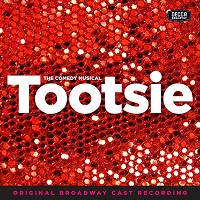 Original Broadway Cast, 2019 (Decca Broadway)
Original Broadway Cast, 2019 (Decca Broadway)  (3 / 5) Librettist Robert Horn and composer/lyricist David Yazbek made some wise moves in translating the popular 1982 comedy film Tootsie into a stage musical — for example, shifting the milieu from a soap opera to a present-day Broadway musical in trouble. The focus remains on Michael Dorsey (Santino Fontana), a jerk of an actor whose desperation leads him to impersonate a woman (“Dorothy Michaels”) to land a role. Michael’s frustrations and hopes are echoed by his better-behaved show biz colleagues, as Yazbek’s brash and brassy score reveals the vicissitudes of the actor’s life. The ensemble expresses joy in “I Like What She’s Doing” when their show starts to improve in rehearsals, and opening night nerves in “The Most Important Night.” Julie Nichols (Lilli Cooper), the actress cast opposite Dorothy in the musical, Juliet’s Nurse, relates the toll that acting takes on personal relationships in the poignant “There Was John.” Sandy (Sarah Stiles), Michael’s neurotic ex-girlfriend, unloads her audition anxieties (“What kind of masochist keeps coming back for more?”) in the rapid-fire mambo number “What’s Gonna Happen.” The song is not quite a match for “Model Behavior” in Yazbek’s Women On The Verge Of a Nervous Breakdown, but it’s easily the funniest number in the score. During all of this, Michael’s roommate Jeff (Andy Grotelueschen) acts as a fresh, raunchy facet of Michael’s conscience. Fontana’s dual roles come alive through his vocal skills, and he nails Michael’s progression. At first, he’s an annoying narcissist making terrible choices, cleverly conveyed in “Opening Number” and “Whaddya Do.” Next, he’s an “Unstoppable” stage success as Dorothy, starting with the diegetic anthem “I Won’t Let You Down.” This serves as Dorothy’s killer audition — Fontana builds and builds triumphantly — and also hints at how “she” will help the show within the show. While the songs reflect Michael’s growth, they’re less successful at showing how Dorothy affects those around her. This isn’t Yazbek’s strongest score, but it serves the comedy of the plot very well. — Laura Frankos
(3 / 5) Librettist Robert Horn and composer/lyricist David Yazbek made some wise moves in translating the popular 1982 comedy film Tootsie into a stage musical — for example, shifting the milieu from a soap opera to a present-day Broadway musical in trouble. The focus remains on Michael Dorsey (Santino Fontana), a jerk of an actor whose desperation leads him to impersonate a woman (“Dorothy Michaels”) to land a role. Michael’s frustrations and hopes are echoed by his better-behaved show biz colleagues, as Yazbek’s brash and brassy score reveals the vicissitudes of the actor’s life. The ensemble expresses joy in “I Like What She’s Doing” when their show starts to improve in rehearsals, and opening night nerves in “The Most Important Night.” Julie Nichols (Lilli Cooper), the actress cast opposite Dorothy in the musical, Juliet’s Nurse, relates the toll that acting takes on personal relationships in the poignant “There Was John.” Sandy (Sarah Stiles), Michael’s neurotic ex-girlfriend, unloads her audition anxieties (“What kind of masochist keeps coming back for more?”) in the rapid-fire mambo number “What’s Gonna Happen.” The song is not quite a match for “Model Behavior” in Yazbek’s Women On The Verge Of a Nervous Breakdown, but it’s easily the funniest number in the score. During all of this, Michael’s roommate Jeff (Andy Grotelueschen) acts as a fresh, raunchy facet of Michael’s conscience. Fontana’s dual roles come alive through his vocal skills, and he nails Michael’s progression. At first, he’s an annoying narcissist making terrible choices, cleverly conveyed in “Opening Number” and “Whaddya Do.” Next, he’s an “Unstoppable” stage success as Dorothy, starting with the diegetic anthem “I Won’t Let You Down.” This serves as Dorothy’s killer audition — Fontana builds and builds triumphantly — and also hints at how “she” will help the show within the show. While the songs reflect Michael’s growth, they’re less successful at showing how Dorothy affects those around her. This isn’t Yazbek’s strongest score, but it serves the comedy of the plot very well. — Laura Frankos
The View UpStairs
 Original Off-Broadway Cast, 2017 (Broadway Records)
Original Off-Broadway Cast, 2017 (Broadway Records)  (3 / 5) A tragic true-life story inspired this musical about The UpStairs Lounge, a popular gay bar in the French Quarter of New Orleans that was destroyed by arson in 1973, resulting in the deaths of 32 people. Max Vernon wrote the book, music, and lyrics. The show employs an interesting narrative device centered around a present-day fashion designer, Wes (Jeremy Pope), who inquires about renting the space where the UpStairs once existed, and who there encounters and interacts with its denizens through a sort of time warp. Among them are the hard-drinking house pianist (Randy Redd), the bulldyke bartender (Frenchie Davis), a budding young Puerto Rican drag queen (Michael Longoria) and his mother (Nancy Ticotin), and the outrageously campy resident diva (Nathan Lee Graham). Also on hand are a priest of the Metropolitan Community Church (Benjamin Howes), a hustler (Taylor Frey) who forms a serious attachment with Wes, and the sketchy guy (Ben Mayne) whom we are led to think may be the one responsible for torching the bar after being ejected from it. While Vernon has trouble avoiding cliché in some of the show’s situations and dialogue, the time-warp setup allows for both jokes and dramatic points to be made as the UpStairs patrons school Wes about gay history and he tells them about the future. Vernon’s ingratiating, eclectic score well suits the characters and effectively sets the atmosphere for the tale, employing period song styles for the bar people and more modern sounds in some of Wes’s material (such as his opening number, “#householdname”). Highlights of the album include the opener, “Some Kind of Paradise,” led by Redd with soulful fervor; “World Outside These Walls,” led by Davis in excellent form; and the big, inspirational number “Theme Song,” featuring the amazing Graham. “Sex on Legs” is quite the show-stopper as delivered by Longoria, possessor of one of the most exciting voices to be heard on or off Broadway. The two prettiest songs in the score are the title tune, which serves as the finale; and “And I Wish,” not included in the Off-Broadway production but heard here as a bonus track, sung by Frey with great vocal beauty and deep emotion. — Michael Portantiere
(3 / 5) A tragic true-life story inspired this musical about The UpStairs Lounge, a popular gay bar in the French Quarter of New Orleans that was destroyed by arson in 1973, resulting in the deaths of 32 people. Max Vernon wrote the book, music, and lyrics. The show employs an interesting narrative device centered around a present-day fashion designer, Wes (Jeremy Pope), who inquires about renting the space where the UpStairs once existed, and who there encounters and interacts with its denizens through a sort of time warp. Among them are the hard-drinking house pianist (Randy Redd), the bulldyke bartender (Frenchie Davis), a budding young Puerto Rican drag queen (Michael Longoria) and his mother (Nancy Ticotin), and the outrageously campy resident diva (Nathan Lee Graham). Also on hand are a priest of the Metropolitan Community Church (Benjamin Howes), a hustler (Taylor Frey) who forms a serious attachment with Wes, and the sketchy guy (Ben Mayne) whom we are led to think may be the one responsible for torching the bar after being ejected from it. While Vernon has trouble avoiding cliché in some of the show’s situations and dialogue, the time-warp setup allows for both jokes and dramatic points to be made as the UpStairs patrons school Wes about gay history and he tells them about the future. Vernon’s ingratiating, eclectic score well suits the characters and effectively sets the atmosphere for the tale, employing period song styles for the bar people and more modern sounds in some of Wes’s material (such as his opening number, “#householdname”). Highlights of the album include the opener, “Some Kind of Paradise,” led by Redd with soulful fervor; “World Outside These Walls,” led by Davis in excellent form; and the big, inspirational number “Theme Song,” featuring the amazing Graham. “Sex on Legs” is quite the show-stopper as delivered by Longoria, possessor of one of the most exciting voices to be heard on or off Broadway. The two prettiest songs in the score are the title tune, which serves as the finale; and “And I Wish,” not included in the Off-Broadway production but heard here as a bonus track, sung by Frey with great vocal beauty and deep emotion. — Michael Portantiere
The 25th Annual Putnam County Spelling Bee
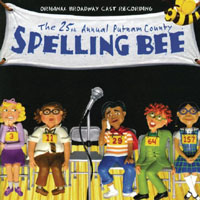 Original Broadway Cast, 2005 (Ghostlight)
Original Broadway Cast, 2005 (Ghostlight)  (4 / 5) This show, about a regional spelling bee with prepubescent contestants, marked the Tony Award winning composer/lyricist William Finn’s return to Broadway after a long absence. For that reason alone, The 25th Annual Putnam County Spelling Bee is worth celebrating. It also happens to be an inventive, warm, and joyful musical. Finn shines best as a writer when his characters are up to his intelligence, and here we have six abnormally smart, strange, prematurely eloquent pre-teens who let their insecurities, jealousies and hormones rage during the competition. It seems evident that Finn enjoyed himself while writing Spelling Bee, as this marks his most playful work since In Trousers. The cast album isn’t given the highest possible rating here only because the score is woven so intricately into Rachel Sheinkin’s excellent libretto (arguably one of the best of its era) that a good deal of it may not impress listeners out of context as much as it does in the theater. One exception is “The I Love You Song,” a beautiful piece in which speller Olive Ostrovksy (played beautifully by Celia Keenan-Bolger) imagines the support and devotion of her parents, neither of whom are present at the bee. The entire cast is definitive, including Deborah S. Craig, Jesse Tyler Ferguson, Dan Fogler, Jose Llana, and Sarah Saltzberg as the other young competitors. In addition to being excellent singers, they are charming, intelligent actors so in tune with their roles that it’s easy to forget they’re all a good decade or two older than the characters. — Matt Koplik
(4 / 5) This show, about a regional spelling bee with prepubescent contestants, marked the Tony Award winning composer/lyricist William Finn’s return to Broadway after a long absence. For that reason alone, The 25th Annual Putnam County Spelling Bee is worth celebrating. It also happens to be an inventive, warm, and joyful musical. Finn shines best as a writer when his characters are up to his intelligence, and here we have six abnormally smart, strange, prematurely eloquent pre-teens who let their insecurities, jealousies and hormones rage during the competition. It seems evident that Finn enjoyed himself while writing Spelling Bee, as this marks his most playful work since In Trousers. The cast album isn’t given the highest possible rating here only because the score is woven so intricately into Rachel Sheinkin’s excellent libretto (arguably one of the best of its era) that a good deal of it may not impress listeners out of context as much as it does in the theater. One exception is “The I Love You Song,” a beautiful piece in which speller Olive Ostrovksy (played beautifully by Celia Keenan-Bolger) imagines the support and devotion of her parents, neither of whom are present at the bee. The entire cast is definitive, including Deborah S. Craig, Jesse Tyler Ferguson, Dan Fogler, Jose Llana, and Sarah Saltzberg as the other young competitors. In addition to being excellent singers, they are charming, intelligent actors so in tune with their roles that it’s easy to forget they’re all a good decade or two older than the characters. — Matt Koplik
Violet
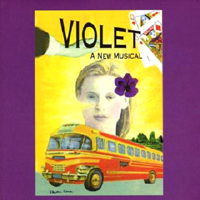 Original Off-Broadway Cast, 1998 (Resmiranda)
Original Off-Broadway Cast, 1998 (Resmiranda)  (3 / 5) Dorris Betts’ short story “The Ugliest Pilgrim” — about a young woman who, maimed by an axe blade as a child, goes on a journey of healing — was the basis for this gem with music by Jeanine Tesori and lyrics by Brian Crawley. Lauren Ward’s Violet is a complex heroine; injured inside and out, she’s full of both bitterness and hope, and her lovely performance translates well onto the recording. It’s when Violet’s biting tongue turns sweet that she sings the highlight of the score, “Lay Down Your Head,” with a melody that makes one’s heart ache. The other songs don’t quite reach that level of simple perfection, but a few that come close are the all-too-brief “Water in the Well,” the thrilling “Let It Sing,” and “On My Way,” a rousing ensemble number that sets Violet and her fellow passengers off on their bus trip. Violet’s trek takes her from North Carolina to Oklahoma, where she goes to meet the televangelist whom she hopes will heal her. On the way, she becomes involved in a love triangle with two soldiers, one white (played by Michael Park), the other black (played by Michael McElroy). Crawley tells their story through colloquial lyrics that feel effortless and natural, and Tesori comes up with a handful of fine countrified tunes. Her gospel songs are less distinguished, but the Broadway Gospel Choir and the powerhouse singer-actor McElroy give this spirited musical some real soul. — Brooke Pierce
(3 / 5) Dorris Betts’ short story “The Ugliest Pilgrim” — about a young woman who, maimed by an axe blade as a child, goes on a journey of healing — was the basis for this gem with music by Jeanine Tesori and lyrics by Brian Crawley. Lauren Ward’s Violet is a complex heroine; injured inside and out, she’s full of both bitterness and hope, and her lovely performance translates well onto the recording. It’s when Violet’s biting tongue turns sweet that she sings the highlight of the score, “Lay Down Your Head,” with a melody that makes one’s heart ache. The other songs don’t quite reach that level of simple perfection, but a few that come close are the all-too-brief “Water in the Well,” the thrilling “Let It Sing,” and “On My Way,” a rousing ensemble number that sets Violet and her fellow passengers off on their bus trip. Violet’s trek takes her from North Carolina to Oklahoma, where she goes to meet the televangelist whom she hopes will heal her. On the way, she becomes involved in a love triangle with two soldiers, one white (played by Michael Park), the other black (played by Michael McElroy). Crawley tells their story through colloquial lyrics that feel effortless and natural, and Tesori comes up with a handful of fine countrified tunes. Her gospel songs are less distinguished, but the Broadway Gospel Choir and the powerhouse singer-actor McElroy give this spirited musical some real soul. — Brooke Pierce
Victor/Victoria
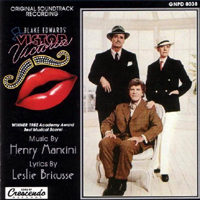 Film Soundtrack, 1982 (MGM/Rhino/GNP Crescendo)
Film Soundtrack, 1982 (MGM/Rhino/GNP Crescendo)  (1 / 5) The Blake Edwards film that served as the basis for Julie Andrews’ last Broadway musical is really a comedy with a few incidental songs. Based on a 1933 German film, it stars Andrews as Victoria, a light opera soprano stranded in 1930s Paris. She’s taken in by Toddy (Robert Preston), a gay nightclub performer who reinvents her as Victor, a Polish female impersonator. Trouble sets in when King Marchan, a Chicago gangster (James Garner), finds himself attracted to “Victor.” The wildly padded soundtrack disc is filled with instrumental interludes from Henry Mancini’s easy-listening score. The film’s few actual songs, with lyrics by Leslie Bricusse, are heard repeatedly in different versions; for example, the silly specialty item “The Shady Dame From Seville.” Andrews and Preston are never less than pros, but this recording is barely worthwhile. — David Barbour
(1 / 5) The Blake Edwards film that served as the basis for Julie Andrews’ last Broadway musical is really a comedy with a few incidental songs. Based on a 1933 German film, it stars Andrews as Victoria, a light opera soprano stranded in 1930s Paris. She’s taken in by Toddy (Robert Preston), a gay nightclub performer who reinvents her as Victor, a Polish female impersonator. Trouble sets in when King Marchan, a Chicago gangster (James Garner), finds himself attracted to “Victor.” The wildly padded soundtrack disc is filled with instrumental interludes from Henry Mancini’s easy-listening score. The film’s few actual songs, with lyrics by Leslie Bricusse, are heard repeatedly in different versions; for example, the silly specialty item “The Shady Dame From Seville.” Andrews and Preston are never less than pros, but this recording is barely worthwhile. — David Barbour
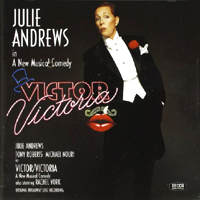 Original Broadway Cast, 1995 (Philips/Decca)
Original Broadway Cast, 1995 (Philips/Decca)  (1 / 5) Julie Andrews’ much-anticipated return to Broadway was upstaged to a certain extent by this show’s many peripheral dramas, including Andrews’ frequent absences, her Tony Awards boycott, and the notorious replacement runs of Liza Minnelli and Raquel Welch. Victor/Victoria was a long-run disappointment, a ham-fisted adaptation of a hit Andrews film put together by a mediocre creative team led by Andrews’ husband, director-librettist Blake Edwards. As in the film, which was also written and directed by Edwards, Andrews’ Victoria is transformed into Victor by Toddy, played here by Tony Roberts (see the review above for more of the plot). Even with her voice darkened by age and afflicted with mannerisms, Andrews is fun to hear on the album; but to get to the pleasant bits, you’ll have to put up with some of the weakest songs ever written for a Broadway show. The main culprits are Henry Mancini and Leslie Bricusse, but additional music was written by Frank Wildhorn after Mancini’s death. “If I Were a Man” sets up the plot in the most laborious fashion. Even worse is “King’s Lament,” in which Victoria’s love interest, King Marchan (Michael Nouri), wrestles with his masculinity. The rock-bottom songs go to Rachel York in the role of King’s chorine girlfriend; they include “Chicago, Illinois” from the movie version (“Smack on the lake, this is a rare port / Someday, they say, we’ll have an airport!”) and the egregious “Paris Makes Me Horny,” which rummages through the names of European cities for the sake of smutty jokes. (Sample: “Been to Munich, where every guy’s a eunuch.”) Andrews makes something out of generic ballads like “Crazy World” (again, from the film) and “Living in the Shadows,” and she has fun with “Le Jazz Hot” (also from the film), but she and Nouri are defeated by the deadly “Almost a Love Song,” which has almost a melody. An unintentional camp highlight is “Louis Says,” one of Victor’s onstage numbers, in which Andrews swans about the stage as Marie Antoinette. Just try to parse the impenetrable stream-of-consciousness lyrics of this song. — D.B.
(1 / 5) Julie Andrews’ much-anticipated return to Broadway was upstaged to a certain extent by this show’s many peripheral dramas, including Andrews’ frequent absences, her Tony Awards boycott, and the notorious replacement runs of Liza Minnelli and Raquel Welch. Victor/Victoria was a long-run disappointment, a ham-fisted adaptation of a hit Andrews film put together by a mediocre creative team led by Andrews’ husband, director-librettist Blake Edwards. As in the film, which was also written and directed by Edwards, Andrews’ Victoria is transformed into Victor by Toddy, played here by Tony Roberts (see the review above for more of the plot). Even with her voice darkened by age and afflicted with mannerisms, Andrews is fun to hear on the album; but to get to the pleasant bits, you’ll have to put up with some of the weakest songs ever written for a Broadway show. The main culprits are Henry Mancini and Leslie Bricusse, but additional music was written by Frank Wildhorn after Mancini’s death. “If I Were a Man” sets up the plot in the most laborious fashion. Even worse is “King’s Lament,” in which Victoria’s love interest, King Marchan (Michael Nouri), wrestles with his masculinity. The rock-bottom songs go to Rachel York in the role of King’s chorine girlfriend; they include “Chicago, Illinois” from the movie version (“Smack on the lake, this is a rare port / Someday, they say, we’ll have an airport!”) and the egregious “Paris Makes Me Horny,” which rummages through the names of European cities for the sake of smutty jokes. (Sample: “Been to Munich, where every guy’s a eunuch.”) Andrews makes something out of generic ballads like “Crazy World” (again, from the film) and “Living in the Shadows,” and she has fun with “Le Jazz Hot” (also from the film), but she and Nouri are defeated by the deadly “Almost a Love Song,” which has almost a melody. An unintentional camp highlight is “Louis Says,” one of Victor’s onstage numbers, in which Andrews swans about the stage as Marie Antoinette. Just try to parse the impenetrable stream-of-consciousness lyrics of this song. — D.B.
Very Good Eddie
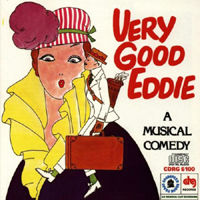 Broadway Cast, 1975 (DRG)
Broadway Cast, 1975 (DRG)  (3 / 5) Very lively, very catchy, very melodic — but not Very Good Eddie. The Goodspeed Opera House’s revival of the 1915 Jerome Kern musical — the first show in the famed Princess Theatre series — was such a hit in Connecticut that David Merrick picked it up and brought it intact to Broadway, where it ran for nearly a year. But, as is Goodspeed’s bad habit, the production fiddled with perfectly fine original material. The result was a kind of hybrid, with several songs missing and others appropriated from various other Kern shows, so much so that nine lyricists are credited! Russell Warner’s lean orchestrations are probably reasonable reductions of Frank Saddler’s originals but, as musical director/conductor, Warner sticks pretty much to one speed: “rollicking.” Yes, the score is full of infectious ragtime, but even ragtime should have more variety than this. Worse, the performance style evinces much winking and borderline camping, especially among the women: Virginia Seidel’s Minnie-Mouse-on-speed chirping just about kills the irresistible “Left All Alone Again Blues,” and Travis Hudson stomps “Moon of Love” into the floorboards. But male leads Charles Repole and David Christmas are more appealing, and the chorus numbers, such as “I’ve Got to Dance” and “Hot Dog,” are so ingratiating that you will, in fact, want to get up and dance. — Marc Miller
(3 / 5) Very lively, very catchy, very melodic — but not Very Good Eddie. The Goodspeed Opera House’s revival of the 1915 Jerome Kern musical — the first show in the famed Princess Theatre series — was such a hit in Connecticut that David Merrick picked it up and brought it intact to Broadway, where it ran for nearly a year. But, as is Goodspeed’s bad habit, the production fiddled with perfectly fine original material. The result was a kind of hybrid, with several songs missing and others appropriated from various other Kern shows, so much so that nine lyricists are credited! Russell Warner’s lean orchestrations are probably reasonable reductions of Frank Saddler’s originals but, as musical director/conductor, Warner sticks pretty much to one speed: “rollicking.” Yes, the score is full of infectious ragtime, but even ragtime should have more variety than this. Worse, the performance style evinces much winking and borderline camping, especially among the women: Virginia Seidel’s Minnie-Mouse-on-speed chirping just about kills the irresistible “Left All Alone Again Blues,” and Travis Hudson stomps “Moon of Love” into the floorboards. But male leads Charles Repole and David Christmas are more appealing, and the chorus numbers, such as “I’ve Got to Dance” and “Hot Dog,” are so ingratiating that you will, in fact, want to get up and dance. — Marc Miller
The Utter Glory of Morrissey Hall
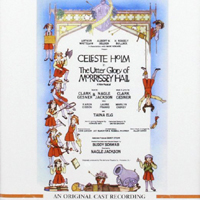 Original Broadway Cast, 1979 (Original Cast Records)
Original Broadway Cast, 1979 (Original Cast Records)  (2 / 5) This was a good idea: a sort of unofficial musical version of the old “St. Trinian’s” stories and movies about an English school filled with horrid little girls. The first 10 minutes of the show are fun, as authors Clark Gesner and Nagle Jackson (who also directed) set up various characters and story lines — and then simply abandon them. The rest of The Utter Glory of Morrissey Hall is plotless, filled with incidents that don’t tie together. For example, one group of girls believe they’re about to be sold into white slavery; a young boy in love mails himself to his girlfriend in a trunk; and there’s a grown-up romance between a secretary and a salesman who must hide their passion. Presiding over all of this is the dotty headmistress, played amusingly by Celeste Holm. As events spin out of her control, the woman simply withdraws, locking herself in her office and happily pressing flowers. Gesner, the composer-lyricist of You’re a Good Man, Charlie Brown, provides a score that’s lightly mocking in a stiff-upper-lip sort of way, but with nothing substantial to hang these songs on, they don’t add up to much. — David Wolf
(2 / 5) This was a good idea: a sort of unofficial musical version of the old “St. Trinian’s” stories and movies about an English school filled with horrid little girls. The first 10 minutes of the show are fun, as authors Clark Gesner and Nagle Jackson (who also directed) set up various characters and story lines — and then simply abandon them. The rest of The Utter Glory of Morrissey Hall is plotless, filled with incidents that don’t tie together. For example, one group of girls believe they’re about to be sold into white slavery; a young boy in love mails himself to his girlfriend in a trunk; and there’s a grown-up romance between a secretary and a salesman who must hide their passion. Presiding over all of this is the dotty headmistress, played amusingly by Celeste Holm. As events spin out of her control, the woman simply withdraws, locking herself in her office and happily pressing flowers. Gesner, the composer-lyricist of You’re a Good Man, Charlie Brown, provides a score that’s lightly mocking in a stiff-upper-lip sort of way, but with nothing substantial to hang these songs on, they don’t add up to much. — David Wolf
Urinetown
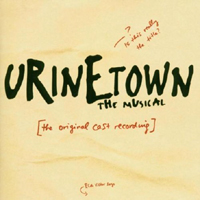 Original Broadway Cast, 2001 (RCA)
Original Broadway Cast, 2001 (RCA)  (4 / 5) This show, which winks at Bertolt Brecht-Kurt Weill works and like-minded tuners, poses the musical question: Is it possible for a score to be too clever? The answer is probably yes. To complement a book about a Mahagonny-type burg where the citizens are oppressed by a corporation that controls all restrooms, composer-lyricist Mark Hollmann and lyricist-librettist Greg Kotis wrote a tuneful score that cannily mocks even as it pays homage. While hooting at musical cliches in song and dialogue, the creators walk a thin line with the agility of world-class aerialists. Spilling from this words-and-notes cornucopia are send-ups of such musical conventions as title tunes, double-edged ballads (“Follow Your Heart”), comedy turns (“Don’t Be the Bunny”), and heart-lifters (“Run, Freedom, Run!”). The cast is led by staunch Hunter Foster, full-of-his-bad-self John Cullum, cute-as-a-frayed-button Spencer Kayden, sincere Jennifer Laura Thompson, and Jeff McCarthy, who places his tongue very firmly in his cheek in the role of Officer Lockstock. All have the required fervor. The problem is an embarrassment of riches that begins to tire the listener as the songs, delivered by a dynamic ensemble, start to sound alike. Of course, those who experience Urinetown only via the recording can’t see the wonders worked by John Rando and John Carrafa, who followed the tunesmiths’ ribbing of various styles of musical theater writing by doing the same with their direction and choreography, respectively. Still, the score is far above average for contemporary musicals and very well played by a sassy five-person band, with Edward Goldschneider at the piano. — David Finkle
(4 / 5) This show, which winks at Bertolt Brecht-Kurt Weill works and like-minded tuners, poses the musical question: Is it possible for a score to be too clever? The answer is probably yes. To complement a book about a Mahagonny-type burg where the citizens are oppressed by a corporation that controls all restrooms, composer-lyricist Mark Hollmann and lyricist-librettist Greg Kotis wrote a tuneful score that cannily mocks even as it pays homage. While hooting at musical cliches in song and dialogue, the creators walk a thin line with the agility of world-class aerialists. Spilling from this words-and-notes cornucopia are send-ups of such musical conventions as title tunes, double-edged ballads (“Follow Your Heart”), comedy turns (“Don’t Be the Bunny”), and heart-lifters (“Run, Freedom, Run!”). The cast is led by staunch Hunter Foster, full-of-his-bad-self John Cullum, cute-as-a-frayed-button Spencer Kayden, sincere Jennifer Laura Thompson, and Jeff McCarthy, who places his tongue very firmly in his cheek in the role of Officer Lockstock. All have the required fervor. The problem is an embarrassment of riches that begins to tire the listener as the songs, delivered by a dynamic ensemble, start to sound alike. Of course, those who experience Urinetown only via the recording can’t see the wonders worked by John Rando and John Carrafa, who followed the tunesmiths’ ribbing of various styles of musical theater writing by doing the same with their direction and choreography, respectively. Still, the score is far above average for contemporary musicals and very well played by a sassy five-person band, with Edward Goldschneider at the piano. — David Finkle
The Unsinkable Molly Brown
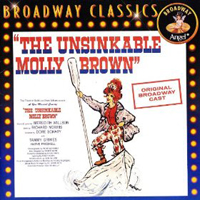 Original Broadway Cast, 1960 (Capitol/Angel)
Original Broadway Cast, 1960 (Capitol/Angel)  (4 / 5) “I ain’t down yet!” shouts/sings the title character of this rowdy musical based on the real-life story of Molly Brown, and that might also be the motto of the show itself. Composer-lyricist Meredith Willson wrote this score right after his spectacular success with The Music Man. In a sense, The Unsinkable Molly Brown is the feisty younger sister of that great American musical; it’s rough around the edges, but just as appealing in its own way. One reason for its initial success was the casting of the young Tammy Grimes and Harve Presnell, who were instantly recognized for their star quality in the show’s leading roles. Grimes’ inimitable voice is perfect for Molly, and her performance on the album is full of energy, especially in the rousing “I Ain’t Down Yet” and “Belly Up to the Bar, Boys.” Presnell’s gorgeous baritone is a joy; when he belts out “I’ll Never Say No,” goose bumps rise. The album is so well recorded that it makes you feel as if you’re seated front-row-center for this joyous musical. Oddly, although Johnny Brown’s “Colorado, My Home” is in the show’s printed score and the melody is heard briefly in the overture, the song is not sung by Presnell on the album. But the recording is otherwise quite full, and since so many numbers were cut from the film version of Molly Brown and its soundtrack album (see below), this is your best opportunity to hear the bulk of the original score, including “I’ve A’ready Started In,” “My Own Brass Bed,” “Bea-u-ti-ful People of Denver,” “Are You Sure,” “If I Knew,” “Chick-a-Pen,” and “Dolce Far Niente.” — Gerard Alessandrini
(4 / 5) “I ain’t down yet!” shouts/sings the title character of this rowdy musical based on the real-life story of Molly Brown, and that might also be the motto of the show itself. Composer-lyricist Meredith Willson wrote this score right after his spectacular success with The Music Man. In a sense, The Unsinkable Molly Brown is the feisty younger sister of that great American musical; it’s rough around the edges, but just as appealing in its own way. One reason for its initial success was the casting of the young Tammy Grimes and Harve Presnell, who were instantly recognized for their star quality in the show’s leading roles. Grimes’ inimitable voice is perfect for Molly, and her performance on the album is full of energy, especially in the rousing “I Ain’t Down Yet” and “Belly Up to the Bar, Boys.” Presnell’s gorgeous baritone is a joy; when he belts out “I’ll Never Say No,” goose bumps rise. The album is so well recorded that it makes you feel as if you’re seated front-row-center for this joyous musical. Oddly, although Johnny Brown’s “Colorado, My Home” is in the show’s printed score and the melody is heard briefly in the overture, the song is not sung by Presnell on the album. But the recording is otherwise quite full, and since so many numbers were cut from the film version of Molly Brown and its soundtrack album (see below), this is your best opportunity to hear the bulk of the original score, including “I’ve A’ready Started In,” “My Own Brass Bed,” “Bea-u-ti-ful People of Denver,” “Are You Sure,” “If I Knew,” “Chick-a-Pen,” and “Dolce Far Niente.” — Gerard Alessandrini
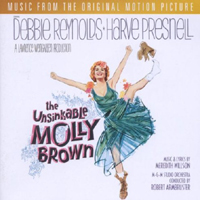 Film Soundtrack, 1964 (MGM/Rhino-Turner)
Film Soundtrack, 1964 (MGM/Rhino-Turner)  (4 / 5) Debbie Reynolds wrapped this musical around her little finger when she made the movie version. While the film is uneven, Reynolds propels it into the realm of a great MGM musical by shouting, grunting, and absolutely refusing to give less than 100 percent of herself to the role of Molly. Happily, Harve Presnell recreates his stunning Broadway performance as Johnny Brown; here, he sounds less big-baritonal and more tenorish than he does on the Broadway recording, but the effect is appropriate for the greater intimacy of the film medium. One of Presnell’s best numbers is the majestic “Colorado, My Home,” absent from the Broadway album. “I Ain’t Down Yet’ and “Belly Up to the Bar Boys” are the high points for Reynolds. Robert Armbruster’s musical direction is excellent, and the thrilling orchestrations are just about up to par with the great MGM musical sound of earlier decades. The only unfortunate aspect of the film and the soundtrack album is that so many of the Broadway songs were excised; missed most of all are “Beautiful People of Denver” and “Are You Sure?” Willson did write one new song for the film: “He’s My Friend,” a free-for-all dance number that helps keep the second half of the movie buoyant, at least until that scene where the Titanic sinks. Rhino’s expanded soundtrack CD is a delight. — G.A.
(4 / 5) Debbie Reynolds wrapped this musical around her little finger when she made the movie version. While the film is uneven, Reynolds propels it into the realm of a great MGM musical by shouting, grunting, and absolutely refusing to give less than 100 percent of herself to the role of Molly. Happily, Harve Presnell recreates his stunning Broadway performance as Johnny Brown; here, he sounds less big-baritonal and more tenorish than he does on the Broadway recording, but the effect is appropriate for the greater intimacy of the film medium. One of Presnell’s best numbers is the majestic “Colorado, My Home,” absent from the Broadway album. “I Ain’t Down Yet’ and “Belly Up to the Bar Boys” are the high points for Reynolds. Robert Armbruster’s musical direction is excellent, and the thrilling orchestrations are just about up to par with the great MGM musical sound of earlier decades. The only unfortunate aspect of the film and the soundtrack album is that so many of the Broadway songs were excised; missed most of all are “Beautiful People of Denver” and “Are You Sure?” Willson did write one new song for the film: “He’s My Friend,” a free-for-all dance number that helps keep the second half of the movie buoyant, at least until that scene where the Titanic sinks. Rhino’s expanded soundtrack CD is a delight. — G.A.
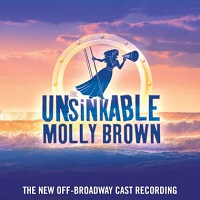 Off-Broadway Cast, 2020 (Broadway Records/Yellow Sound Lab)
Off-Broadway Cast, 2020 (Broadway Records/Yellow Sound Lab)  (3 / 5) A top-to-bottom revamp of this not-quite-classic musical, the Transport Group’s revisal of a show they still insisted on calling The Unsinkable Molly Brown was embraced by some but deplored by others. Courtesy of Dick Scanlan, this production featured an unfocused new book with too many added, extraneous characters, plus a different song stack — a few Meredith Willson songs not found in the original score were thrown in, and there are also some omissions. The cast album eschews an overture and begins with “I Ain’t Down Yet,” which is probably just as well, considering the smallish orchestra heard here; and while David Aron Damane as JJ (f.k.a. Johnny Brown) brings a rich, warm baritone to “I’ll Never Say No” and other songs, we don’t get to hear him sing “Colorado My Home,” as that number is included only as a “bonus track” sung by the ensemble. (Michael Rafter is credited, or debited, with the “adaptation of Meredith Willson’s music,” and Joey Chancey is the music director.) To put it mildly, fans of The Unsinkable Molly Brown in its original form are likely to be nonplussed by all the cuts, additions, and rewrites made for this new creation. Still, the cast album is enjoyable on its own terms, highlighted by Beth Malone’s delightfully spunky performance in the title role, plus some lusty singing from the rest of the company. And for all of the objections that might be filed concerning the major changes made for this revisal, it is nice to have “He’s My Friend,” which Willson wrote specifically for the film version of Molly Brown, finally included in the show score. [Note: This production’s run was abbreviated by the COVID pandemic, and the cast recording sessions were delayed, which accounts for the fact that the album wasn’t released until the summer of 2022.] — Michael Portantiere
(3 / 5) A top-to-bottom revamp of this not-quite-classic musical, the Transport Group’s revisal of a show they still insisted on calling The Unsinkable Molly Brown was embraced by some but deplored by others. Courtesy of Dick Scanlan, this production featured an unfocused new book with too many added, extraneous characters, plus a different song stack — a few Meredith Willson songs not found in the original score were thrown in, and there are also some omissions. The cast album eschews an overture and begins with “I Ain’t Down Yet,” which is probably just as well, considering the smallish orchestra heard here; and while David Aron Damane as JJ (f.k.a. Johnny Brown) brings a rich, warm baritone to “I’ll Never Say No” and other songs, we don’t get to hear him sing “Colorado My Home,” as that number is included only as a “bonus track” sung by the ensemble. (Michael Rafter is credited, or debited, with the “adaptation of Meredith Willson’s music,” and Joey Chancey is the music director.) To put it mildly, fans of The Unsinkable Molly Brown in its original form are likely to be nonplussed by all the cuts, additions, and rewrites made for this new creation. Still, the cast album is enjoyable on its own terms, highlighted by Beth Malone’s delightfully spunky performance in the title role, plus some lusty singing from the rest of the company. And for all of the objections that might be filed concerning the major changes made for this revisal, it is nice to have “He’s My Friend,” which Willson wrote specifically for the film version of Molly Brown, finally included in the show score. [Note: This production’s run was abbreviated by the COVID pandemic, and the cast recording sessions were delayed, which accounts for the fact that the album wasn’t released until the summer of 2022.] — Michael Portantiere
Two’s Company
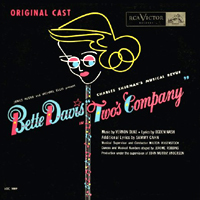 Original Broadway Cast, 1952 (RCA/Masterworks Broadway)
Original Broadway Cast, 1952 (RCA/Masterworks Broadway)  (3 / 5) Bette Davis always claimed that she knew exactly what she was doing when she decided to star in this revue. “Just turn me loose on Broadway as a musical comedy girl,” she sings (?) here. Two’s Company certainly had some prime talent behind it: composer Vernon Duke, lyricists Ogden Nash and Sammy Cahn, choreographer Jerome Robbins, and a strong cast that included David Burns, Ellen Hanley, and Nora Kaye. But the critics were bewildered, and the star’s illness forced the show to close after three sold-out months on Broadway. Without this particular star, Two’s Company would have been just another late-entry collection of topical skits and so-so songs; with her, it has retained a status perched somewhere between legendary disaster and unparalleled curiosity. The cast album certainly makes for interesting listening. The material is adequate, the supporting cast and presentation are strong, and the opening “Theatre Is a Lady” is a worthy anthem. Onstage, Davis’s authority may have masked some of her musical deficiencies, but on the recording, she sounds like a drag impersonator in a piano bar just before last call. Her pitch is uniquely her own, and her phrasing is a harbinger of her odd line readings in her later films. In a hillbilly number, “Purple Rose,” she’s game but uneasy and not very funny, yet she’s touching in the torchy “Just Like a Man.” Since her only subsequent musical was the ill-fated, unrecorded Miss Moffatt, the Two’s Company album is a fascinating footnote to a long, magnificently uneven career. — Richard Barrios
(3 / 5) Bette Davis always claimed that she knew exactly what she was doing when she decided to star in this revue. “Just turn me loose on Broadway as a musical comedy girl,” she sings (?) here. Two’s Company certainly had some prime talent behind it: composer Vernon Duke, lyricists Ogden Nash and Sammy Cahn, choreographer Jerome Robbins, and a strong cast that included David Burns, Ellen Hanley, and Nora Kaye. But the critics were bewildered, and the star’s illness forced the show to close after three sold-out months on Broadway. Without this particular star, Two’s Company would have been just another late-entry collection of topical skits and so-so songs; with her, it has retained a status perched somewhere between legendary disaster and unparalleled curiosity. The cast album certainly makes for interesting listening. The material is adequate, the supporting cast and presentation are strong, and the opening “Theatre Is a Lady” is a worthy anthem. Onstage, Davis’s authority may have masked some of her musical deficiencies, but on the recording, she sounds like a drag impersonator in a piano bar just before last call. Her pitch is uniquely her own, and her phrasing is a harbinger of her odd line readings in her later films. In a hillbilly number, “Purple Rose,” she’s game but uneasy and not very funny, yet she’s touching in the torchy “Just Like a Man.” Since her only subsequent musical was the ill-fated, unrecorded Miss Moffatt, the Two’s Company album is a fascinating footnote to a long, magnificently uneven career. — Richard Barrios
Two on the Aisle
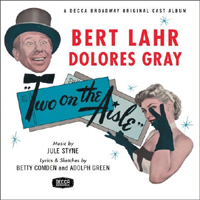 Original Broadway Cast, 1951 (Decca/MCA)
Original Broadway Cast, 1951 (Decca/MCA)  (5 / 5) How does a recording of a second-rank show become an irreplaceable treasure? Here’s how: By 1951, the big-star Broadway revue was beginning to gather up its stars and skits for a finale, largely due to competition from television variety shows. Nevertheless, Betty Comden and Adolph Green still had a few satirical tricks up their sleeves. In collaboration with composer Jule Styne, they came up with a smart throwback to the days of headliner-packed revues, and that’s where Two on the Aisle shone most brightly, in that it starred Broadway’s premier clown and one of the greatest singers ever to set foot on a stage. Nor were their tasks circumscribed, for Bert Lahr could sing (in a unique fashion) and Dolores Gray was an ace comedienne. There were also supporting actors, none of them too impressive, and a rather gruesome pair of singing lovers. Fortunately, the cast album focuses on Lahr and Gray in both musical and comedic modes, without conveying their well-documented backstage feud. All here is golden, or close to it: Lahr’s mock-Pagliacci ode to “The Clown”; the chorus’s “Show Train,” an amusing précis of then-current stage hits; and Lahr and Gray as a vaudeville team invading the Metropolitan Opera (“You’ll be Lucia,” he blusters, “and I’ll be Sextet”). Gray is sensational, her songs perfectly tailored to her fabulous singing — intimate yet volcanic, funny, sexy, and so technically accomplished (with that precise diction) that lieder recitalists should study it. Gray’s performance of “If (You Hadn’t but You Did)” alone earns her a place in the Broadway pantheon. — Richard Barrios
(5 / 5) How does a recording of a second-rank show become an irreplaceable treasure? Here’s how: By 1951, the big-star Broadway revue was beginning to gather up its stars and skits for a finale, largely due to competition from television variety shows. Nevertheless, Betty Comden and Adolph Green still had a few satirical tricks up their sleeves. In collaboration with composer Jule Styne, they came up with a smart throwback to the days of headliner-packed revues, and that’s where Two on the Aisle shone most brightly, in that it starred Broadway’s premier clown and one of the greatest singers ever to set foot on a stage. Nor were their tasks circumscribed, for Bert Lahr could sing (in a unique fashion) and Dolores Gray was an ace comedienne. There were also supporting actors, none of them too impressive, and a rather gruesome pair of singing lovers. Fortunately, the cast album focuses on Lahr and Gray in both musical and comedic modes, without conveying their well-documented backstage feud. All here is golden, or close to it: Lahr’s mock-Pagliacci ode to “The Clown”; the chorus’s “Show Train,” an amusing précis of then-current stage hits; and Lahr and Gray as a vaudeville team invading the Metropolitan Opera (“You’ll be Lucia,” he blusters, “and I’ll be Sextet”). Gray is sensational, her songs perfectly tailored to her fabulous singing — intimate yet volcanic, funny, sexy, and so technically accomplished (with that precise diction) that lieder recitalists should study it. Gray’s performance of “If (You Hadn’t but You Did)” alone earns her a place in the Broadway pantheon. — Richard Barrios
Two Gentlemen of Verona
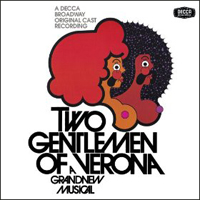 Original Broadway Cast, 1971 (Decca)
Original Broadway Cast, 1971 (Decca)  (3 / 5) When you listen to the original cast recording of Two Gentlemen of Verona, you’ll know why this show won the 1972 Tony Award for Best Musical but not for Best Score. Even though the score, by composer Galt MacDermot and lyricist John Guare, is hopelessly locked into the 1970s, the album is an enjoyable listen; it captures a show of tremendous youth, vivacity, and edge, a unique mixture of Shakespeare and rock. The result is a century-spanning musical party. Sure, there are some duds, such as “Thurio’s Samba,” in which swear words and vulgarities are rhymed with nonsense syllables. But the standouts — “Summer, Summer,” “I Love My Father,” “Night Letter,” “Hot Lover,” and the finale — are quite a bit of fun. A fine cast helps: the one-and-only Raul Julia, Clifton Davis, Diana Davila, and Jonelle Allen, all of whom sound as if they’ve having the time of their lives. — Matthew Murray
(3 / 5) When you listen to the original cast recording of Two Gentlemen of Verona, you’ll know why this show won the 1972 Tony Award for Best Musical but not for Best Score. Even though the score, by composer Galt MacDermot and lyricist John Guare, is hopelessly locked into the 1970s, the album is an enjoyable listen; it captures a show of tremendous youth, vivacity, and edge, a unique mixture of Shakespeare and rock. The result is a century-spanning musical party. Sure, there are some duds, such as “Thurio’s Samba,” in which swear words and vulgarities are rhymed with nonsense syllables. But the standouts — “Summer, Summer,” “I Love My Father,” “Night Letter,” “Hot Lover,” and the finale — are quite a bit of fun. A fine cast helps: the one-and-only Raul Julia, Clifton Davis, Diana Davila, and Jonelle Allen, all of whom sound as if they’ve having the time of their lives. — Matthew Murray
Two by Two
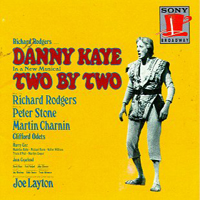 Original Broadway Cast, 1970 (Columbia/Sony)
Original Broadway Cast, 1970 (Columbia/Sony)  (3 / 5) With music by Richard Rodgers, lyrics by Martin Charnin, and a book by Peter Stone, Two by Two is an adaptation of Clifford Odets’ play The Flowering Peach. The show became notorious for the onstage antics of its star, Danny Kaye, who turned the whole thing into an unruly vaudeville act when he resorted to performing the role of Noah in a wheelchair after tearing a ligament. None of his bad behavior need be suffered on the cast album, although showpieces like “Ninety Again!” and “You Have Got to Have a Rudder on the Ark” do reveal a self-indulgent star. Get past that and you’ll hear mostly excellent, late-career Rodgers; the master infuses ballads like “I Do Not Know a Day I Did Not Love You” and “Something Doesn’t Happen” with his trademark warmth and melodic surprises. Eddie Sauter’s orchestrations have a comfy feel, and Charnin’s lyrics are probably the best of his career, pitched midway between the sentiment of Hammerstein and the dexterity of Hart. The supporting cast is as youthful and exuberant as Kaye is old-school and steeped in shtick: Walter Willison sings out with real Broadway juvenile brio, and Madeline Kahn nails a high C at the end of a vulgar piece of special material. The CD has a brief Act I finale track that’s missing from the LP, and it’s a much better sonic mix. — Marc Miller
(3 / 5) With music by Richard Rodgers, lyrics by Martin Charnin, and a book by Peter Stone, Two by Two is an adaptation of Clifford Odets’ play The Flowering Peach. The show became notorious for the onstage antics of its star, Danny Kaye, who turned the whole thing into an unruly vaudeville act when he resorted to performing the role of Noah in a wheelchair after tearing a ligament. None of his bad behavior need be suffered on the cast album, although showpieces like “Ninety Again!” and “You Have Got to Have a Rudder on the Ark” do reveal a self-indulgent star. Get past that and you’ll hear mostly excellent, late-career Rodgers; the master infuses ballads like “I Do Not Know a Day I Did Not Love You” and “Something Doesn’t Happen” with his trademark warmth and melodic surprises. Eddie Sauter’s orchestrations have a comfy feel, and Charnin’s lyrics are probably the best of his career, pitched midway between the sentiment of Hammerstein and the dexterity of Hart. The supporting cast is as youthful and exuberant as Kaye is old-school and steeped in shtick: Walter Willison sings out with real Broadway juvenile brio, and Madeline Kahn nails a high C at the end of a vulgar piece of special material. The CD has a brief Act I finale track that’s missing from the LP, and it’s a much better sonic mix. — Marc Miller

